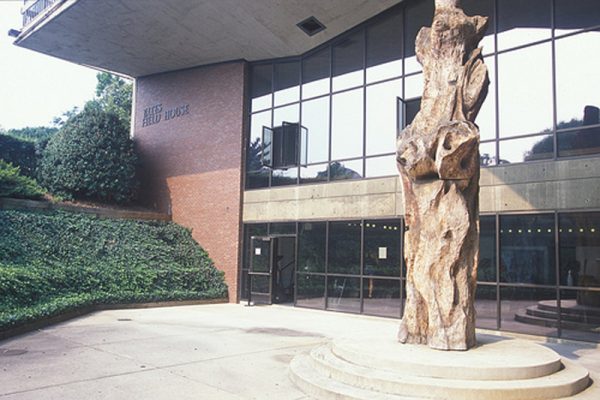As class registration rapidly approaches, Hoyas across campus are crafting their ideal schedules — constantly creating and recreating their Coursicles, scanning Rate My Professor and syncing courses with friends.
For Simone Guité (CAS ’26), that process will include looking for a non-credit Leisure and Recreation Education (LRED) class to fit into her schedule. These physical education classes, which Campus Recreation offers, range from forays into Mindfulness and Meditation to weightlifting in Strength Training 101.
Guité, who discovered these courses going into her sophomore year, said she has taken full advantage of LRED classes, which she feels students often do not hear about given the lengthy list of credit-bearing courses that count toward degree credit.
“Leisure and Recreation Education classes are a hidden gem,” Guité told The Hoya. “I typically don’t have time to work out at Yates because of my heavy workload and club activities, but these classes build that time into my schedule in a very manageable way.”
LRED courses are zero-credit classes that meet twice a week for 50 minutes and give students the chance to take instructed physical education courses with the goal of promoting a healthy and active lifestyle, according to the Georgetown University website.
Bethany Bower, the associate director of Campus Recreation and a LRED swim instructor, said the LRED classes — which are akin to instructed physical education — allow students the chance to learn a new sport or use equipment for the first time.
“We’re offering these kinds of skills classes as a way of saying to our students that here’s this opportunity to come to Yates and take classes you can learn something from,” Bower told The Hoya.
“It’s not just about the exercise equipment,” Bower added. “It’s also about the squash courts and racquetball courts and the tennis courts and to learn how to use them.”
Instructors, Students Cite Wellness Benefits
In interviews with The Hoya, seven Georgetown students said with the stress of college, an LRED course allowed them to get physical exercise, which has both physical and mental benefits.
Aysu Jabrayilova (GRD ’24), who took Mindfulness and Meditation this semester, said she enrolled in LRED courses to help manage the stress that comes with attending Georgetown.
“Last semester, I felt too overwhelmed and stressed, and this type of class helped me to reduce my stress level and relax,” Jabrayilova told The Hoya.
Madison Cheng (CAS ’26), another student in the Mindfulness and Meditation class, said the LRED class she took granted her the opportunity to learn de-stressing techniques.
“I wanted to take a class to learn mindfulness practices, and just kind of have the space and the time dedicated to learning this,” Cheng told The Hoya. “I wouldn’t take time out of my day to do this otherwise, and the LRED course provides me with that time.”
Guité said she enjoyed being able to set a designated time to exercise through an LRED class, something she said is hard to do otherwise.
“I really like that they give me designated times in my week to go to Yates, because otherwise I probably wouldn’t go as frequently,” Guite said.
Georgetown students similarly said they feel overwhelmed and busy, and have thus exercised less. A study in the National Library of Medicine found a positive relationship between physical activity and mental health. The study used the Global Physical Activity Questionnaire and the General Health Questionnaire to measure the physical activity and mental health of 847 undergraduate students. The results showed that high levels of leisure-time physical activity is associated with better mental health.
Nadeem Qureshi, who teaches squash and racquetball LRED classes, said the fact that the courses are free to students, unlike other exercise classes offered at Yates Field House, should encourage them to consider signing up.
“LRED classes are free for Georgetown undergraduate and graduate students, which alone is reason enough for them to enroll,” Quereshi told The Hoya.
Other classes at Yates like spin and yoga cost $8 for a single class and $80 for unlimited access to classes that semester. Exercise classes in the Georgetown area like Soulcycle and Down Dog Yoga cost $20 and $30 respectively.
Student Engagement
With LRED courses offering zero credits and having no outside assignments, some Georgetown students said these policies result in a drop in participation over the course of the semester.
Diya Patel (SFS ’25) began the semester consistently showing up to Mindfulness and Meditation, though she slowly stopped attending.
“It was a great class with a phenomenal teacher, and I really do wish I had attended more sessions,” Patel told The Hoya. “By the later half of the semester, I was so overwhelmed with other stuff that I didn’t attend the class.”
Guité said attendance varied in her LREDs, with attendance issues in her tennis class but consistent student engagement in squash throughout the semester
Qureshi, who instructs the squash course, said student turnout in his classes is generally above average.
“Both squash and racquetball classes are very popular, and students know they must sign up early enough to avoid ending up on the waitlist,” Qureshi said. “Once in the class, students are motivated to learn as much as possible.”
Other schools like the University of Maryland and the University of Vermont offer physical education classes for credit, with mandatory attendance and outside assignments as part of the curriculum.
Sophia Wolin, a sophomore at the University of Maryland, College Park, took a one-credit soccer class that had mandatory attendance and outside assignments.
“We also had weekly assignments such as homework to watch a game or turning in reflections of progress,” Wolin told The Hoya. “I would not skip class because I like soccer.”
Sophie Page, a 2023 graduate of the University of Vermont, took a yoga class for one credit. Page reported having outside assignments for her class, though she still enjoyed it.
“Yoga class had assignments that we were supposed to do for our own well-being outside of class like journaling, meditating, etcetera,” Page told The Hoya. “We would talk about it in the beginning of class, so it encouraged us to think about it and participate in it.”
Due to the class being for credit and students receiving a grade, attendance was also mandatory, and instructors penalized students if they skipped too many classes, Page said.
Should LRED Courses Count for Credit?
To drum up student engagement and encourage regular attendance, some students and instructors have floated the idea of making LRED courses credit-bearing.

Mindfulness and Meditation instructor Kelly Hunger said making the course credit-bearing would have both benefits and drawbacks. As a kinesiology major at the University of Maryland, she was required to take physical education classes for credit.
“Absolutely more people would show up if it was for credit,” Hunger told The Hoya. “I did have the option of taking courses like this for my undergraduate degree in kinesiology for credit, so I think there is value in having it for credit, but at the same time, I don’t know if that fits the programs here.”
Cheng expressed hesitancy at the idea of credit-bearing LRED classes, citing that she was drawn in part to the course because of its flexibility.
“I would probably go more often if it was for credit, but I might not have taken it in the first place,” Cheng said. “Sometimes I have really busy days or tests or just days when I get behind on things that I need that extra time, so it’s nice to have the flexibility that if I can’t make it, it’s okay.”
Bower said assigning credit to LRED courses would fundamentally change their function from wellbeing to academic.
“It’s never really been set up as an academic thing,” Bower said. “We advertise them through Coursicle, and you can register through MyAccess for them, but they really are just supported through Campus Recreation.”
Patel said she would not have registered for a credit-bearing LRED because that would cause her to overload on credits.
“If the class had been for credit, I don’t think I would have signed up, or even been able to sign up without overloading because of the credit limit per semester,” Patel said.
Graduate students often pay per credit, so adding on an additional credit or two for an LRED class could cost upward of $2,000.
“I don’t think that I would add an LRED if it was for credit because credit is too expensive,” Jabrayilova said. “To pay $2,000 for this class is too much.”
Bower also noted that if offered for credit, LRED classes could potentially cost an additional activity fee. Students currently pay an activity fee of $92.50.
For the Fall 2024 semester, Georgetown students can choose from LRED classes like strength training, beginning and intermediate swimming, yoga, tennis, squash, racquetball and meditation. Each section ranges from six to 20 available seats.
Emma Vonder Haar (CAS ’26) said she signed up for a yoga LRED class as an effort to care for her mental and physical wellbeing and feels making attendance mandatory could endanger those positive benefits.
“It’s nice to do something once or twice a week that only benefits me intrinsically,” Vonder Haar told The Hoya. “It is not working towards a future goal or success, but just being there for yourself.”
The “Mindfulness and Meditation” course particularly focuses on students’ wellbeing through Pranayama breathing techniques and physical movements. The class adapts to students’ specific needs during the school year, while teaching about self-care and balance.
As an instructor, Hunger said making attendance mandatory and having outside assignments, which would happen if LRED classes were for credit, could defeat the purpose of the class.
“I would like more people showing up consistently, but at the same time it is a mind-body course. I want to meet people where they are, and I realize that that may not mean they are able to come as consistently as I would like, because it is just life,” Hunger said. “It would be lovely if they could, but also I don’t want this course since it is in that mind-body field to be stressful.”
Cheng said taking an LRED course has given her time to work on her physical and mental health.
“I think they are a great way to make use of Georgetown’s resources,” Cheng said. “You get to incorporate your health and mental well-being into your schedule during the week.”








